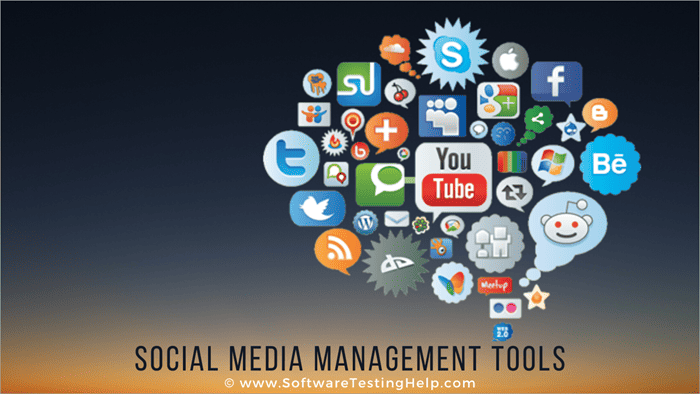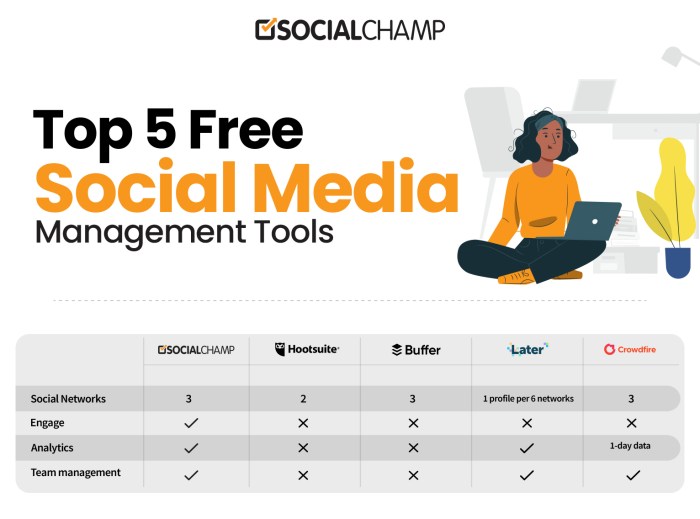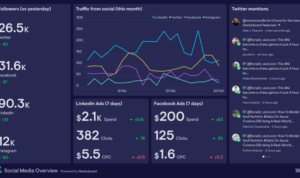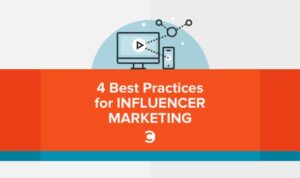Kicking off with Social Media Management Tools, this topic dives into the essential tools businesses need to streamline their marketing efforts and boost online presence. From scheduling to analytics, these tools play a crucial role in modern digital marketing strategies.
Importance of Social Media Management Tools

In today’s digital age, social media management tools have become essential for businesses looking to establish a strong online presence and effectively engage with their target audience. These tools offer a wide range of benefits that can streamline various tasks and enhance marketing strategies.
Streamlined Tasks
- Content Scheduling: Social media management tools allow businesses to plan and schedule posts in advance, ensuring consistent and timely content delivery.
- Analytics Tracking: These tools provide valuable insights into the performance of social media campaigns, helping businesses to make data-driven decisions.
- Community Management: With features like social listening and engagement tools, businesses can effectively interact with their audience and build meaningful relationships.
Benefits for Marketing Strategies
- Increased Efficiency: By automating tasks such as content publishing and monitoring, social media management tools save time and resources, allowing businesses to focus on strategic initiatives.
- Improved Targeting: With advanced targeting options and analytics, businesses can reach the right audience with personalized content, leading to higher engagement and conversions.
- Consistent Branding: These tools help maintain a cohesive brand presence across different social media platforms, reinforcing brand identity and awareness.
Features to Look for in Social Media Management Tools
When choosing a social media management tool for your business, it’s important to consider key features that can help streamline your social media efforts and maximize your online presence.
Analytics Capabilities
Having robust analytics capabilities is crucial for tracking the performance of your social media campaigns. Look for tools that offer detailed insights into key metrics such as engagement, reach, and conversion rates. By analyzing this data, you can better understand your audience and optimize your content strategy for improved results.
Scheduling and Automation
Scheduling and automation features can save you time and effort by allowing you to plan and publish content in advance. Look for tools that offer the ability to schedule posts across multiple platforms, as well as automate repetitive tasks like posting at specific times or responding to messages. This can help you maintain a consistent online presence without constantly being tied to your social media accounts.
Popular Social Media Management Tools

In the ever-evolving world of social media, having the right tools to manage your online presence is crucial. Let’s take a look at some of the most popular social media management tools available in the market today.
Hootsuite
Hootsuite is a well-known social media management platform that allows users to schedule posts, engage with followers, and track analytics across multiple social media platforms. With customizable pricing plans based on the needs of individuals, small businesses, and enterprises, Hootsuite offers scalability options for all types of users. One of the unique features of Hootsuite is its social listening capabilities, which allow users to monitor conversations about their brand across various social media channels.
Buffer
Buffer is another popular social media management tool that focuses on simplicity and ease of use. Users can schedule posts, analyze performance metrics, and collaborate with team members all within the Buffer platform. With tiered pricing plans based on the number of users and social accounts, Buffer offers flexibility and scalability for businesses of all sizes. A standout feature of Buffer is its Pablo tool, which allows users to create engaging visuals for social media posts.
Sprout Social
Sprout Social is a comprehensive social media management tool that combines scheduling, analytics, and engagement features in one platform. With pricing plans tailored for small businesses, agencies, and enterprises, Sprout Social offers a range of options to suit different needs. One of the standout features of Sprout Social is its CRM integration, which allows users to manage customer relationships and track interactions across social media channels.
Later
Later is a visual social media scheduler that specializes in Instagram and visual content planning. Users can plan and schedule posts, track analytics, and collaborate with team members on content creation. Later offers free and paid pricing plans, making it accessible to businesses of all sizes. A unique feature of Later is its Linkin.bio tool, which allows users to create a shoppable Instagram feed by linking posts to specific products or web pages.
Integrating Social Media Management Tools
Integrating social media management tools with other marketing platforms is crucial for maximizing efficiency and effectiveness in reaching target audiences. By seamlessly connecting various tools and platforms, businesses can streamline their processes and ensure a cohesive brand presence across different channels.
Platforms that can be integrated with Social Media Management Tools
There are several platforms that can be integrated with social media management tools to create a seamless workflow. Some examples include:
- Customer Relationship Management (CRM) systems like Salesforce or HubSpot, which can help track customer interactions and tailor social media content accordingly.
- Email marketing platforms such as Mailchimp or Constant Contact, allowing for synchronized campaigns across email and social media channels.
- Advertising platforms like Google Ads or Facebook Ads Manager for optimizing ad performance and targeting based on social media insights.
Impact of Integrated Analytics on Marketing Strategies, Social Media Management Tools
Integrated analytics from social media management tools can provide valuable insights that can significantly impact overall marketing strategies. By analyzing data from different platforms in one place, businesses can:
- Gain a comprehensive view of audience behavior and preferences across various channels.
- Measure the effectiveness of campaigns and adjust strategies in real-time for better results.
- Identify trends and patterns to inform future marketing initiatives and optimize ROI.





